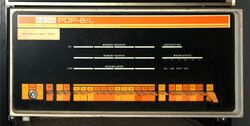PDP-8/L
From Computer History Wiki
Revision as of 12:11, 14 July 2023 by Jnc (talk | contribs) (Reverted edits by Larsbrinkhoff (talk) to last revision by ForOldHack)
| PDP-8/L | |
 PDP-8/L from an ICS Astrotype system | |
| Year Introduced: | 1968 |
|---|---|
| Form Factor: | minicomputer |
| Word Size: | 12 |
| Logic Type: | TTL |
| Design Type: | clocked random logic |
| Clock Speed: | 312KHz |
| Memory Speed: | 1.6 µseconds |
| Physical Address Size: | 8KW (requires optional MC-8/L) |
| Virtual Address Size: | 4KW |
| Memory Management: | none |
| Bus Architecture: | positive logic I/O bus |
| Operating System: | TSS/8 |
| Predecessor(s): | PDP-8/I |
| Successor(s): | PDP-8/E |
The PDP-8/L was a effectively a cost-reduced version of the PDP-8/I in the PDP-8 line; it apparently had the same CPU as the -8/I.
The primary differences between the two are:
- The -8/L was slightly slower
- The -8/L used a positive I/0 bus, not negative
- The -8/L was not pre-wired for a number of devices
- The -8/L could not accomodate the Extended Arithmetic Element
- The -8/L supported a maximum of 8KW of main memory
Options for the -8/L included:
- DW08-A Negative I/O Bus Interface, to allow use of older PDP-8 devices
- MC-8/L Memory Extension Control, bank switching needed to support more than 4K words of memory
- MP-8/L Memory Parity
The MC-8/L differed from the MC-8/I of the PDP-8/I in that the Instruction Field and Data Field registers were only one bit wide, not three bits as in the MC-8/I.
It could perform an addition to the accumulator in 3.2 µseconds, and a subtraction in 6.4 µseconds.
External links
- PDP-8/L - Original PDP-8/L documents
- PDP-8/L-Maintenance-Manual-Volume-1 - Maintenance manual.
| v • d • e PDP-8 Computers, Software and Peripherals |
|---|
| PDP-8s: PDP-5 • PDP-8 • LINC-8 • PDP-8/S • PDP-8/I • PDP-8/L • PDP-12 • PDP-8/E • PDP-8/F • PDP-8/M • PDP-8/A
Workstations: VT78 Also: PDP-8 family • PDP-8 architecture • PDP-8 Memory Extension units |